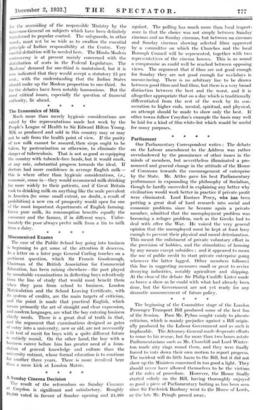Parliament Our Parliamentary Correspondent writes : The debate on the
Labour amendment to the Address was rather overshadowed by the prominence of other issues in the minds of members, but nevertheless illuminated a pro- nounced and general change in the attitude of the House of Commons towards the encouragement of enterprise by the State. Mr. Attlee gave his best Parliamentary performance in expounding the philosophy of Socialism, though he hardly succeeded in explaining any better why civilization would work better in practice if private profit were eliminated. Lord Eustacc Percy, who has been putting a great deal of hard research into social and economic problems since he became again a private member, admitted that the unemployment problem was becoming a refugee problem, such as the Greeks had to deal with after the War. He voiced the very general opinion that the unemployed must be kept at least busy enough to prevent their physical and moral deterioration. This meant the enlistment of private voluntary effort in the provision of hobbies, and the stimulation of housing by any means except subsidies ; and it appeared to mean the use of public credit to start private enterprise going wherever the latter lagged. Other members followed this line in suggesting measures small or great to revive decaying industries, notably agriculture and shipping. At the close of the debate Sir Philip Cunliffe Lister made as brave a show as he could with what had already been done, but the Government arc not yet ready for any dramatic announcement of future policy.










































 Previous page
Previous page